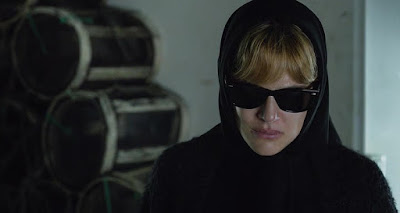It's
high time we stopped talking about Almodóvar making the same cinema
over and over. Even his previous film,
Los
amantes pasajeros
is
rather an attempt to step in the same river twice or to
play
with old toys. At press-conference in Cannes Almodóvar confessed to
watching Bergman's films in the course of preparation for the
shooting of Juileta.
Judging by his interviews Bergman is hardly Spanish director's
all-time favorite but curiously enough the powerful Bergmanian
prelude of red color might be the only duly reappropriated borrowing
in all of the movie.
The
relentless assault on directors of the past seems to be over,
inventive kitschy opening titles are out of favor. Almodóvar could
resisit using some flamboyant wallpaper, a lovely teapot and similar
familiar trifles but they are a unobliging part of interior design on
par with non-Almodóvary dark painting by Lucian Freud which
sometimes comes into view without really adding any dimensions.
You'll find some Hitchcock here if you want to but it's routine and
decoration more than anything else as well.
Ornamentality
of parts that used to embody Almodóvar's style is an evidence
of
movida withdrawing into the past. The nostalgic Spaniard doesn't have
much to do apart from filling the film with sings of his past youth.
Going
back to Juileta's
coming into life, it was rather strange: Almodovar is reported to
have been studying Antonio Lopez Garcia's paintings, Jeanne Moreau's
gate and reading books.
All
of this to supposedly get absorbed into grief. The superficiality of
educated man's leasure-time diversion shows even though it's true
that you can never completely trust a director. The events in the
film also move on a slower-than-usual pace, Alberto Igesias's music
is more even, and the only song
(marvellous
but unappropriately passionate Si
no te vas by
Chavela Vargaz)
is
forced out to play to the end titles but even there seems out of
place. The most prominent ambassador of Spanish movida developed an
interest in drama, but if you look closely the frenetic trembling of
the present moment in his early movies might seem more profound than
the somberness of today. While it's true that Madrid cultural scene
of
the 1980s never neglected fashion and design, fear, AIDS, drugs and
so-called Pact of Forgetting (it's interesting that at first Julieta
was supposed to be called Silence)
was
a reverse side of seemingly thoughtless
joie de vivre.
Judging
by the result, Almodóvar decided that impulsive behavior and the
tumult of colors that made him famous are not suitable for a dramatic
story and opted for restraint. This is what makes the new film
different from previous ones since in effect this isn't the first
time he turned to history
(flashbacks,
diaries, investigations are vital to the narratives of
All
About My Mother (1999)
and
later in
Talk
to Her
(2002), Bad
Education
(2004) etc.).
And
just like before it's a private story, although Julieta
is particularly detached from the society (she teaches classical
literature for a while and then lives in the countyside or in Madrid
without much going out).
Regardless
of formal devices (a
diary-letter, flashbacks, plain talking and a lucky scene on a train
which is sort of transporting both Julieta and the viewer into the
past) the former camp quality of Almodóvar's films becomes detached
from its conext (the past, in effect) and becomes merely ornamental.
The
painful memories of generation are substituted with private story
based on the commonplace juxtaposition of
Eros
and Thanatos.
It's
so generic that the fact that Julieta
was to become Almodóvar's first English-language film seems only
natural.
Only
two scenes with slow-motion are tryly “camp” here, sublime and
out of place. The deer who is slowly running almost towards the
train's window is meant to serve as foreplay to a sex scene. The
moment is so beautiful as personification of nature's force of desire
that later attempt to counter-point sex with guilt seems almost
stupid.
It's
tempting to read the plot where grief and silent guilt
destroy the relationship between Julieta
and her daughter as a metaphor for the Pact of Forgetting. However,
the incongruence of style (not
the old one already but not new yet),
lack
of attachment to the world of movida
or the present tell that what we see is rather one more universal
story. It seems that in Almodóvar's idea serious drama only happens
“nowhere” and “nowhen”.
There's
hardly a reason to talk about Almodóvar as an old man mumbling,
though. He hasn't become a reactionary. Even though there's no trace
of former abundance of vice, the only scene with allusions to
homosexual relationship is telling. The conversation that we see and
hear implies that secular education and sexual freedom can lead to
religious fanaticism if they are imbued with repressed feeling of
guilt. This is clearly the case when the director is clearly aware of
his own nostalgic tendencies and the key to the film can be found in
protagonist's speech. When Julieta speaks about destructive absence,
it's not only about her relationship with daughter but also about the
film where telling the story of two women means oblivion for an epoch
and its people. They are absent and thus destroy the film. Julieta
becomes a “zombie” (two
of the music themes are named Walking
like a zombie
and director himself several times referred to his protagonist as
such in the interviews).
She
decided not to speak about her psychic trauma and contaminated
everuthing around with guilt. The film itself fails for similar
reasons. Nostalgia, the feeling of guilt and desire to try something
new, love for gaudy cakes and seeming (?) necessity to throw them
into the bucket pull Julieta
in different directions. So we have a deceptively simple but very
contradictory film.
But
then maybe Almodóvar is just happy to be transported into his world
of women with every sound of clapper and doesn't care much about the
passing Angel of History.
Original is here. The text was translated for the Warsaw FIPRESCI project. Unfortunately, just when I recieved a formal invitation I had to decline it. So here it is.
Тэкст быў перакладзены для ўдзелу ў Warsaw FIPRESCI project. Ад паездкі, на жаль, давялося адмовіцца, але пераклады я вырашыў размясціць тут.









No comments:
Post a Comment